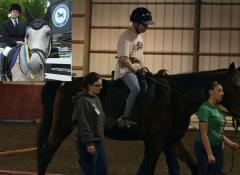
Ray Popik - Getting Back in the Saddle
Ray and his mother were thinking of what a person in a wheelchair could do for sports. They considered riding and kayaking but he’s always loved animals. He started showing. It just grew from there. He felt very comfortable. The walls of Ray Popik’s room are lined with colorful award ribbons for his performance in equestrian events; many are for first place, second place and one is for reserve champion. Commanding the room is stately photo of Ray, astride his horse Poppy along with a silver award emblazoned with “Grand Champion Riding Division.”
A love of sports and animals make horseback riding the perfect activity for Ray, who lives with a neurologic disorder. “The first time I got on a horse, it just felt incredibly natural and comfortable,” he recalls. However when Ray moved from his home in Maryland to Inglis in 2013, he had to give up this hobby. Fortunately, an Inglis endowed fund, established by a generous donor to support resident educational activities, enables Ray to enjoy weekly sessions at Philadelphia’s Pegasus Riding Academy.
Ray says that riding does wonders for a person’s self-esteem and confidence. “It feels fantastic to be accomplishing something. “Before I began riding, I thought I’d never be able to do anything athletic again,” he says. “It feels fantastic to accomplish something.”
Ray’s long-term goal is to be part of US para-Olympic equestrian team in 2020. The primary focus of para-equestrian sport is to provide educational and competitive opportunities for athletes with physical disabilities. Many disabled athletes compete, and even excel, in sports designed for the able-bodied, but para-equestrian in particular opens a world of competition to riders and drivers with even severe disabilities that might preclude them from other forms of sport, and does so while providing a structured, focused, and highly competitive environment.
Ray talks about getting to know a horse and developing a bond. It’s important to go into the stable before and after dismount. You need to feed and pet the horse. That bond and that relationship is vital. There is a mental communication that the horse and an experienced rider can have, which comes from that bond.
